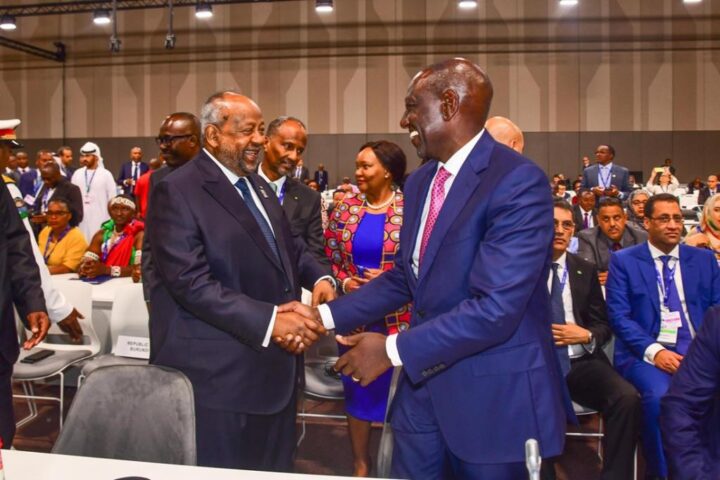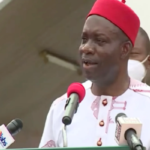Anambra State Governor Professor Chukwuma Soludo, the other day during a special meeting with town union presidents-general, canvassed selection of women as town union presidents or leaders.
The call by the Professor of Economics and former central bank governor comes amid growing concerns over rights of women and their much-needed participation in nation building. It comes on the heels of international acclaim for gender rights, respect and freedom for all, irrespective of sex, language or religion, just as African women’s participation in politics and leadership is affected negatively by a litany of social, economic, religious and cultural barriers.
Join our WhatsApp ChannelIn the traditional Igbo society where Soludo holds sway as governor since March 2022, town unions are recognized by law as veritable community leadership forum whose primary responsibility is to engender development and transformative initiatives in rural communities. They work hand-in-hand with traditional rulers. Thus, while the traditional ruler is the custodian of the culture and cultural footstool, the town union is an umbrella body responsible for engendering peace, security and progress through social, economic and political engagements.
READ ALSO: Nigerians React As Soludo Wants Women To Head Town Unions
Howbeit recognized by the subnational governments in Nigeria’s five South East States of Anambra, Imo, Abia, Enugu and Ebonyi, town unions remain autonomous and seldom rely on government support. Even so, they serve as gateway for government and development agencies to the communities, and on many occasions provide the communities access to government. In other words, in planning development programmes, government or development agencies partner with town union executives to prioritize development programming based on each of the communities’ specific needs. Also, with deference to matters other than culture, the town union is a policy-making organ of any community. Hence, they can, on their own, initiate, plan and implement a transformative agenda on behalf of the entire community.
There have been pockets of clashes in many Southeast communities where the powers of the monarch and those of the town union are not clearly delineated. Such clashes often revolve around management of community funds. This is one area where, as agents of peace, participation of women in town union administration becomes critically handy.
Despite being recognized as powerful agents of change, women are still grossly underrepresented in leadership positions, not just at the community level, but, across all strata of the African society, even though Africans are the first to celebrate whenever women are appointed to important positions elsewhere in the West.
Yet, Nigerian women, whenever the rare opportunity arises, have not failed to demonstrate capacity by rising up to the occasion to bring in positive change, furthering the cause of peace, social justice and inclusiveness in their areas of influence.
The late Professor Dora Akunyili who brought positive change to Nigeria’s NAFDAC, a critical food and drug agency, at a time the country badly needed to tackle its debilitating corruption, food/drug adulteration and smuggling must have been on Soludo’s mind as he made the call on town unions. Other amazons like Nigeria’s Ngozi Okonjo-Iweala, the former Coordinating Minister for the Economy and incumbent Director-General of the World Trade Organisation (WTO) and Oby Ezekwesili are also good instances of how women have been able to discharge themselves when given important tasks to discharge.
United Nations (UN), for instance, recognizes that peace accords are likely to be more effective when women are involved. According to the UN, “a peace agreement, which includes women, is 35 per cent more likely to last at least 15 years.” Why the world body thinks critically of this is because, “without the solid foundation of peace, development is doomed to be unstable and unsustainable.”
No doubt, women have been actively involved in championing community development. Most of their activities fall under the aegis of women groups. Such activities, in most cases, are witnessed on issues affecting women and children alone.
It is our thinking that, since women have been notably successful in their activities over the years, it is more reason they should be empowered to do more by assuming the leadership of town union governments. Women’s participation in town union governance has become increasingly expedient, since, the males’ dominance in community governance structure has not really solved many of Nigeria’s problems of youth restiveness, insecurity, deprivation, poverty, malnutrition, poor primary healthcare, poor access to education, gender inequality and discrimination, among many other problems prevalent in rural communities.
In the social architecture of the family, women, not men, are considered the most important in terms of child formation and general wellbeing of the home. This, perhaps, is attributed to their role as mothers and caregivers. Whether a child becomes useful or a nuisance to the society, it is to a large extent a direct consequence of the kind of nurture he or she received at home – basically from the mother. Aware of this great responsibility, women can go the extra mile to seek protection, not only for the child, but also for the environment where he exists.
Men, as adventurous as they may pose, have never contested this privileged position of women in family life. Thus, a typical African man, especially those not in tune with the 21st century realities, values a woman for her ability to take care of the home, kids and her man, neglecting her other qualities. Such belief is captured in the axioms – the way to a man’s heart is through his stomach, and a woman’s place is in the kitchen. Viewed with this primordial lenses, we believe that, a woman may have other qualities and still be considered not good enough in society, if she is unable to display culinary expertise.
This culture, however obnoxious, receives tacit support from some women. While many households aspire to the highest position and education for their female children, some women train their girl child to be good enough for the men. The problem with this is that, no matter the number of positions for leadership available for women, there might be very few of them ready and equipped to occupy them. Regrettably, the term, ‘wife material’ is a mantra on social media that has given voice to persons who have little life skills, other than, what it takes to attract and keep a man. On this note, we suggest that the advocacy for women in leadership should be taken to schools and religious organizations to encourage the youths to either acquire skills or put interest in the affairs of the local community and by extension national politics.
Granted that in the past, some cultures wouldn’t allow the girl child to attain a particular height in education or to occupy certain positions in the society. The reason given for this, is that, she may challenge the men in knowledge and authority, and this has grievous implication on her ability to attract a husband. But, the society has advanced. In today’s world, the right of access to education and other opportunities is available to all irrespective of gender.
We acknowledge that the axioms that have been used to keep women down and seconded to men over the years have no place in modern society, except the one inclined to retrogression. Little wonder, President Mohammed Buhari’s statement in 2016, in far-away Germany, that his wife belongs to his “kitchen, living room and the other room”, received strong criticism. Pundits believe that as a leader, the statement weighs negatively, not just on the fundamental human rights of Nigerian women, but also, against the international conventions on gender and women’s rights to which Nigeria is signatory. The Sustainable Development Goal 5, for instance, discourages all forms of discrimination, violence and any harmful practices against women and girls in the public and private spheres. In addition, it advocates for equal opportunities and active involvement of women in leadership at all levels of political and economic decision-making.
Mrs. Aisha Buhari, represents the portrait of a modern Nigerian woman– courageous, vocal and assertive. A woman not satisfied with being a mother and wife alone, but, actively involved 0al 3 and SDG Goal 5. This can be done through trainings and skill acquisition programmes, in addition to enlightenment campaigns.















![Gender Activism An Economic Necessity In Africa [PBA Editorial]](https://www.primebusiness.africa/wp-content/uploads/2023/11/vaw-720x480.png)

Follow Us